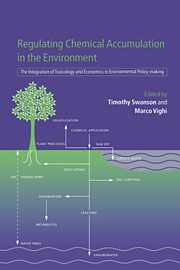 Regulating Chemical Accumulation in the Environment
Regulating Chemical Accumulation in the Environment Book contents
- Frontmatter
- Contents
- List of contributors
- Preface: The regulation of pesticides in Europe – past, present and future
- Acknowledgements
- Introduction
- Part I The characteristics of accumulative chemicals
- Part II Estimating the costs of chemical accumulation
- Part III The analysis of market and regulatory failure
- 7 Market failure
- 8 Regulatory failure
- Part IV Policies for regulating chemical accumulation
7 - Market failure
Published online by Cambridge University Press: 17 August 2009
- Frontmatter
- Contents
- List of contributors
- Preface: The regulation of pesticides in Europe – past, present and future
- Acknowledgements
- Introduction
- Part I The characteristics of accumulative chemicals
- Part II Estimating the costs of chemical accumulation
- Part III The analysis of market and regulatory failure
- 7 Market failure
- 8 Regulatory failure
- Part IV Policies for regulating chemical accumulation
Summary
Introduction
This chapter examines the reasons why private decision-making on the part of agricultural chemical manufacturers might lead to products with socially undesirable characteristics being sold in socially inefficient quantities. The source of the problem is market failure: some significant economic factor goes ‘unpriced’, so that economic activity is undertaken without consideration of its full impact. Two market failures will be considered. The first is the presence of externalities (both the standard story of a damage externality, in which agents considered only the private, and not social, costs of their actions; and a ‘surplus externality’, arising because profit-maximising firms consider only the marginal consumer, instead of all consumers, in their production decisions). The second is imperfect competition – the effect of the structure of the agriculture chemical manufacturing industry (a small number of large multinationals competing in the same product market) on producer's choices of chemical characteristics.
Externalities
An externality arises when the decisions of some economic agents (individuals, firms, governments) – whether in production, in consumption, or in exchange – affect other economic agents, and are not included in the priced system of commodities, i.e. they are not compensated. An alternative way of expressing this problem is to say that property rights are not assigned appropriately, so that the incidence of effect does not coincide with the distribution of legally recognised controls. A third equivalent statement is that economic agents consider only their private marginal costs when making decisions; they do not consider the total, or social (marginal), costs of their actions. It is the gap between private and social marginal costs that gives rise to the externality.
- Type
- Chapter
- Information
- Regulating Chemical Accumulation in the EnvironmentThe Integration of Toxicology and Economics in Environmental Policy-making, pp. 185 - 199Publisher: Cambridge University PressPrint publication year: 1998


